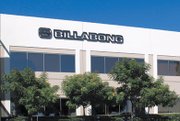Billabong Reacts to TPG Capital Bid
Billabong International Ltd. is trying to avoid a wipeout.
The Australian-headquartered surf brand maintains a highly influential Irvine, Calif.–based American division and owns some of the industry’s most popular labels, such as RVCA and Element.
But it hit waves of problems after an ambitious period that crested in 2010, when Billabong went on a shopping spree and acquired everything from fashion brands such as RVCA to e-commerce retailer Swell (www.swell.com), core surf bricks-and-mortar chain Becker Surf & Sport and 138-store Canadian retail chain West 29.
But Billabong’s fortunes have taken a turn in recent weeks. The powerhouse brand announced on Feb. 17 it plans to pay off
$285 million in debt by selling off 51.5 percent of watch and accessories brand Nixon, its star property, to Trilantic Capital Partners. And on Feb. 20, the company found itself a takeover candidate when private-equity group TPG Capital made a bid to acquire all of Billabong for $3 a share. With offices in San Francisco and Fort Worth, Texas, TPG is perhaps best known in the fashion industry for acquiring J. Crew Group Inc. in 2011 and Neiman Marcus in 2005.
Billabong’s board had earlier rejected TPG’s bid because of a condition in the deal that demanded the surfwear maker not sell any of its properties. On Feb. 20, TPG resubmitted its bid, with the condition that no other brands but Nixon be sold.
“Put simply, the board could not risk the future of the company and ignore the burden at hand to explore any last-minute, highly conditional, non-binding proposal that had the ability to leave the company exposed, given the current pressures on our balance sheet,” said Ted Kunkel, Billabong’s chairman, during a Feb. 16 conference call. He added that “we, as a board, continue to be prepared to engage with anybody who puts forward a proposal which is in the best interests of the company and its shareholders.”
Australian-based analyst Greg Dring said a sale could happen, but Billabong also could remain independent by repeating the history of a fellow surf brand. He said the company could follow the course of fellow surf brand Quiksilver Inc., which was saddled with crushing debt after acquiring French ski label Rossignol in 2005. Quiksilver sold the brand for $147 million in 2008 and restored its balance sheets. Quiksilver survived because its brand equity was strong. It was able to continue to maintain high sales of its core brands through its tough times, said Dring, who works for Macquarie Research.
However, Dring indicated that times were still very tough for Billabong, which expanded during a difficult economic period. “Billabong’s market time couldn’t have been worse,” he said. Dring later wrote that Billabong has breathing room—six months, perhaps—to improve its coverage ratios or its ability to pay off its interest expenses.
It already has taken steps of raising capital through selling equity in Nixon. The company also could take other steps such as cutting its dividends to shareholders or look for another injection of capital. The Billabong board also noted that it would slash overhead by closing 150 stores and cutting 400 positions. Candidates for store closure and job cuts have not been disclosed.
Shaheen Sadeghi, a former Quiksilver president who remains close to the surfwear business, agreed with Dring. “The issue is a balance-sheet issue and not a branding issue,” he said. “The market is impatient. Billabong will need to work through its debt and balance-sheet issues very quickly.” Sadeghi is chief executive of The Lab Holding, which owns and maintains specialty shopping centers The Lab and The Camp in Costa Mesa, Calif.
Gregory Weisman, a partner in Los Angeles–based law firm Silver & Freedman who represents many action-sports brands, said he thought TPG’s offer of $3 per share was probably not high enough. “This company enjoyed a high stock price for a long time based upon some solid brand acquisitions. I believe the management of Billabong will likely be bullish in their confidence that the company will regain a lot of that value,” he said. Like Sadeghi, Weisman said he believes Billabong will rebound thanks to its brand equity.
But as the American economy regains confidence, sales are climbing for the surf brand. In the six months that ended Dec. 31, Billabong said, retail sales for its Americas division climbed 5.1 percent and its online sales continued to make big gains.—Andrew Asch
UPDATE: Billabong rejected a second, higher buyout offer from TPG Capital upon the advice of the company’s non-executive directors and a major shareholder.






















